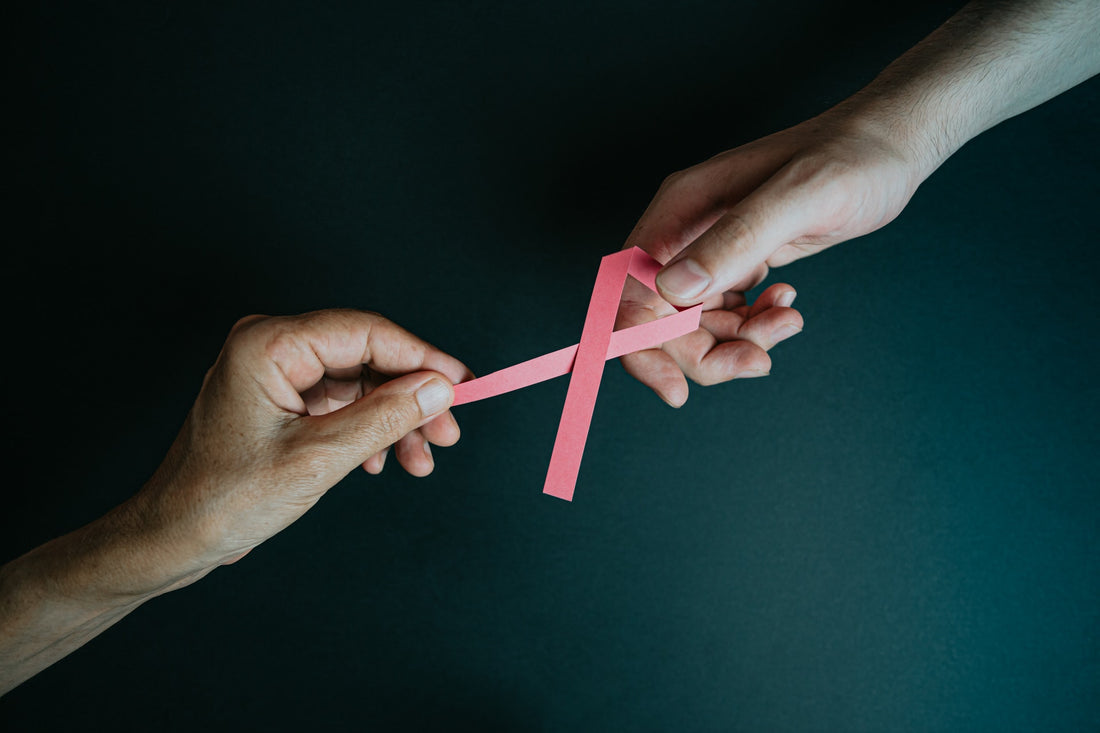
Breast Cancer and Your Immune System: What You Need to Know
Share
In just a few weeks, we commemorate Breast Cancer Awareness Month. This year alone, nearly 300,000 new breast cancer cases will be diagnosed, with an estimated 1 in 8 American women developing the disease at some point in their lives. As cases continue to rise, researchers have identified interesting connections between breast cancer and your immune system. If you want to reduce your risks of the disease, here’s what you need to know.
Breast Cancer and Your Immune System: A Complex Web of Factors
 The cells in your immune system, and the health of these cells, impact breast cancer and vice versa.
The cells in your immune system, and the health of these cells, impact breast cancer and vice versa.
“Lymphocytes, including T cells, T regulatory cells, and natural killer cells, and their cytokine release patterns are implicated in both primary prevention and recurrence of breast cancer,” reports one study issued in the Journal of the Society for Integrative Oncology. “Cancer prognosis may be related to immune system functional status. The hypothesis that the immune system has a causal role in breast cancer etiology is supported by epidemiologic, preclinical, and clinical research. Empirical support for the concept that immune status and immunomodulatory therapy have important roles in comprehensive breast cancer treatment is provided.”
For example, the study notes that:
- Your natural killer cells (NK cells) help prevent breast cancer, and your immune system may not be able to do this if you don’t have sufficient NK cell numbers or NK cell activity.
- There is a commonly observed correlation between a weakened or compromised immune system, and a higher risk of breast cancer and tumor growth.
- A weakened immune system increases the negative impacts of stress, which in turn may affect breast cancer risks.
The important interplay between breast cancer and your immune system is so powerful, that scientists are now working on ways to use your immune system to actually treat breast cancer. “Researchers are working to create new treatments that use the immune response to target cancer cells,” reports the nonprofit Breastcancer.org. “As a group, these treatments are called biological therapies or immunotherapies.”
While more research is needed, and the link between your risks of breast cancer and your immune system strength remains controversial for some researchers, one thing is clear: It’s important to use diet, lifestyle habits, and supplements to support a strong immune system and reduce your risks of chronic diseases like cancer.
Breast Cancer and Your Immune System: Immune- and Health-Boosting Ideas to Try
If you or someone you know has breast cancer, is at a higher risk of developing breast cancer, or has questions about breast cancer, it’s always important to seek qualified medical advice and talk to your medical care provider. While you discuss your concerns with a professional, some specific strategies may help enhance your immunity, reduce your risks, and influence the link between breast cancer and your immune system.
1. Manage a Healthy Weight
There are “remarkable effects of fat loss on the immune system,” reports ScienceDaily. “Australian scientists have shown for the first time that even modest weight loss reverses many of the damaging changes often seen in the immune cells of obese people.”
In those who were overweight, losing just a few pounds helped boost your T-cells and the activation of your circulating immune cells.
Weight loss also impacts your breast cancer odds. “Women who lose weight after age 50 and keep it off have a lower risk of breast cancer than women whose weight stays the same,” notes the American Cancer Society. “Women who lost 2 to 4.5 kg (about 4.4 to 10 lbs.) had a 13% lower risk than women with stable weight. <…> Women who lost 9 kg or more (20+ lbs.) had a 26% lower risk.”
2. Stop Drinking Alcohol
Reduce or eliminate your intake of wine, beer and other spirits. Alcohol intake significantly impairs your immune response, and just one drink a day can increase your breast cancer risks.
3. Exercise Regularly
Regular exercise supports a strong immune system, helps flush out toxins, bacteria and viruses, and may help to circulate your white blood cells so they can do a better job of eliminating disease and infection. Regular exercise also reduces the risks of all types of cancer, including breast cancer.
4. Eat More Foods For Breast Cancer and Your Immune System
Some foods are able to enhance your immunity and help to prevent breast cancer. “Notably, studies associate other eating patterns like the Mediterranean diet with a reduced risk of breast cancer,” notes HealthLine. Moreover, specific foods may even protect against this illness.”
Prominent examples include:
- Leafy green vegetables
- Citrus fruits
- Fish
- Berries
- Fermented foods
- Beans
While you’re enhancing your diet, take time to also enhance your supplement routine. BioPro-Plus 500 is a unique dietary supplement that is clinically proven to increase CD4 cell counts. CD4 cells (T-cells) are white blood cells that play a major role in your body’s own natural immune system response. Without adequate CD4 cells, the preexisting disease may run rampant in your body and you are even more vulnerable to new infections.
References:
- https://www.breastcancer.org/symptoms/understand_bc/statistics
- https://www.ncbi.nlm.nih.gov/pmc/articles/PMC2845458/
- https://www.nature.com/articles/ni1582
- https://www.breastcancer.org/tips/immune/response
- https://www.sciencedaily.com/releases/2010/04/100420101347.htm
- https://www.cancer.org/latest-news/study-finds-losing-weight-after-50-may-lower-breast-cancer-risk.html
- https://www.aicr.org/news/new-report-just-one-alcoholic-drink-a-day-increases-breast-cancer-risk-exercise-lowers-risk/
- https://www.healthline.com/nutrition/breast-cancer-foods#foods-to-eat

